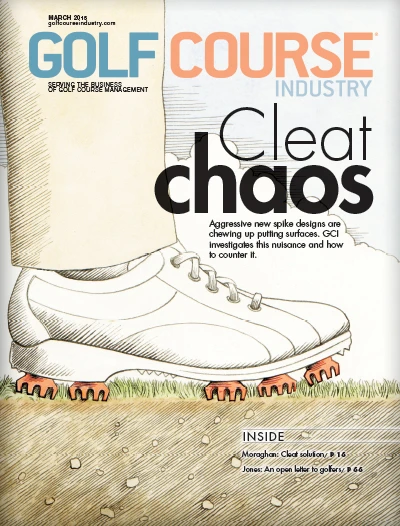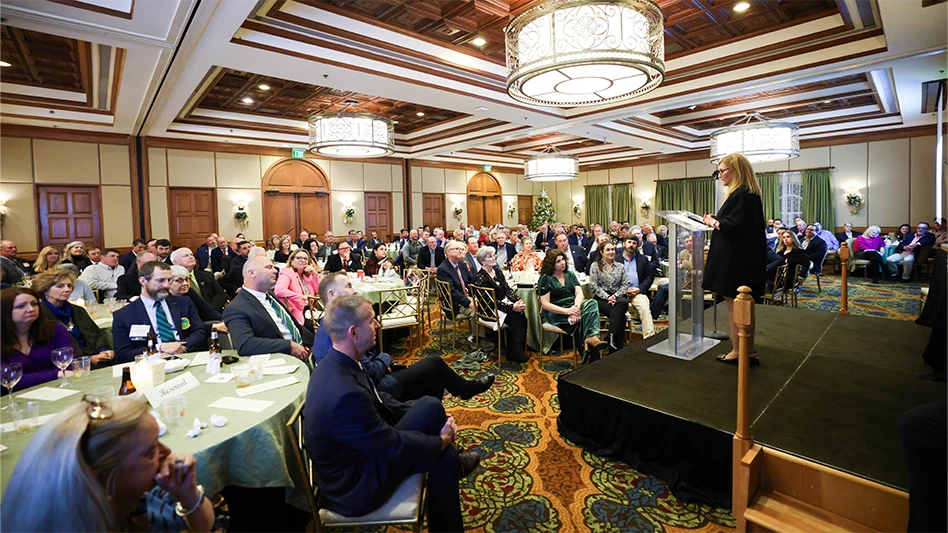 Some people are born to their profession but Andy Ipock came to his via the grave. His father Lennis dug more than 4,000 burial plots over a 30-year career – all by hand. Like most kids, Ipock helped the old man from time to time, earning a few dollars, learning to work the dirt. Over time, he dreamed of being a landscaper. Eventually, he became a superintendent at The Country Club of the Crystal Coast on North Carolina’s Outer Banks.
Some people are born to their profession but Andy Ipock came to his via the grave. His father Lennis dug more than 4,000 burial plots over a 30-year career – all by hand. Like most kids, Ipock helped the old man from time to time, earning a few dollars, learning to work the dirt. Over time, he dreamed of being a landscaper. Eventually, he became a superintendent at The Country Club of the Crystal Coast on North Carolina’s Outer Banks.
Years later, the father – with “forearms like Popeye” and since retired – went to work for the son. Looking to ease Dad into golf, Ipock asked him to dig holes for trees to be planted around the clubhouse. When he returned, the holes were in the right places, and perfectly square. Old habits are hard to break. It wasn’t the last head-scratcher in their working relationship.
Soon after, Ipock and the club’s general manager were outside the pro shop looking down the 10th fairway as someone ran a tractor over a quick coupler sending water gushing 30 feet into the air. “Who’s that idiot?” the GM asked as the driver fled the tractor for dry ground. “That’s my dad,” Ipock shouted over his shoulder, already in a sprint to catch the still-moving tractor.
“I’d fire him about once a month,” Ipock, 35, laughs now. “He’d leave but then he’d be back the next morning as if nothing had happened.” That went on for years.
For all the fun he pokes at his father, Ipock does so with no small amount of gratitude. “He’s one of a kind” he says. “His work ethic is above and beyond. He’s my hero.”
That work ethic is a hallmark of the son, and one of the reasons The Country Club of the Crystal Coast survived a near-death experience through the recession and has since regained considerable health. There’s next to nothing Ipock hasn’t done at the club. His being a Jack of all trades has been one of their aces since a fateful board meeting when the treasurer announced the club had $700 in the bank.
With two infants and a mortgage on a new house, Ipock had already taken a 10 percent pay cut. That was a Tuesday night in spring 2009 and he remembers thinking, “Hold on… We get paid on Thursdays. How in the heck is that going to happen?”
In the year to that point, the club lost more than 200 members and ran a $300,000 deficit. “Everything was a mess,” Ipock says. “Everyone else pretty much jumped ship.”
Ipock walked out of that meeting haunted by the ghosts of superintendents past. “At that point, I was learning more and more about the golf industry and how volatile it was,” he says. “I’d hear about guys losing jobs without warning and I was thinking, ‘I’m going to be one of those guys. I guess I’d better get to the unemployment office.’”
He never quite made it. Club members stepped forward and with their own money – some of it through personal loans - staved off bankruptcy. Ipock picked up a check on the Thursday and kept coming to work. Over the following year, with most of the senior staff gone, “Everything pretty much came back to me,” he says.
 The club eventually secured a new GM, Chip Chamberlin, an industry veteran from Michigan and Florida, who himself had become “one of those guys” after decades at Donald Ross-designed Dunedin Country Club. He was happy for the opportunity and Ipock was happy to have help. They’ve made a good team. Membership is up to nearly 340 and the club, celebrating its 40th anniversary, has been profitable for each of the past three years.
The club eventually secured a new GM, Chip Chamberlin, an industry veteran from Michigan and Florida, who himself had become “one of those guys” after decades at Donald Ross-designed Dunedin Country Club. He was happy for the opportunity and Ipock was happy to have help. They’ve made a good team. Membership is up to nearly 340 and the club, celebrating its 40th anniversary, has been profitable for each of the past three years.
There was also $110,000 from the state to pay for an easement in a first-of-its-kind green flood mitigation project. The Country Club of the Crystal Coast is squeezed onto barely 100 acres of a narrow barrier island that runs like a rib separating Bogue Sound from the Atlantic Ocean. “The whole island is basically a septic system,” Ipock says. A heavy rain would often flood the town of Pine Knoll Shores.
The collaborative city, state and club project installed a powerful system to draw storm water through the course and its natural filtering system of ponds and eventually into the Sound. “The town notifies me when a storm is coming and I start lowering my ponds,” Ipock says. “We’re on a giant sand dune basically so I can run water for hours and you’ll never see any of it on the golf course.”
The NC Division of Water Quality and other agencies closely monitor water quality leaving the golf course and entering the sound, which is home to significant and sensitive shellfish populations. Water is now cleaner than it used to be, the town is less susceptible to flooding and golfers can be back on the course quicker. Economically, agronomically and environmentally, “We’re all better off,” Ipock says.
Ipock’s old-fashioned grit and initiative has been critical. “Andy does a phenomenal job,” Chamberlin says. “He’s one of the top two superintendents I’ve worked with in 36 years as a general manager. He does a great job and has helped this club come back from almost not making it.”
Ipock had never been on a golf course when he took a job as a laborer in 2002. Two days after graduating with an agronomy degree from North Carolina State University, his fiancée spotted a newspaper ad. It paid just $7 an hour, but it was something.
Six months later, he was promoted to assistant superintendent. Within three years, he was the superintendent and has been saving the club money ever since. Some of it is easy to show in black and white. His maintenance costs come in under budget ever year. Last year he was $15,000 in the black.
“It’s easy to save on budget when you’ve got nothing to spend,” he laughs, harking back to the dark days when purchasing became COD. “We save a ton because we do a lot of stuff in-house. Honestly, I get offended if they (the club) go out and ask for bids on anything.”
 So Ipock does it all. For examples: He built a 5,000 sq. ft MiniVerde putting green for a $8,000. He built stone walls at the club entrance that go with myriad stone and paving features he’s installed across the course. There’s more than 200 feet of tongue-and-groove bulk heading in the clubhouse he did at cost – $35 a linear foot versus $120-plus for a contractor.
So Ipock does it all. For examples: He built a 5,000 sq. ft MiniVerde putting green for a $8,000. He built stone walls at the club entrance that go with myriad stone and paving features he’s installed across the course. There’s more than 200 feet of tongue-and-groove bulk heading in the clubhouse he did at cost – $35 a linear foot versus $120-plus for a contractor.
He wouldn’t mind upgrading his aging TifDwarf surfaces but “membership is very much against it.” They are more than happy with the putting quality he produces despite a lot of mutations. “I treat my greens like an ultradwarf and they respond very well,” he says.
Ipock appreciates the people who showed faith in him and exercised patience at critical times. “I kept hearing from vendors ‘You guys haven’t paid your bill,’” he says. “But a lot of them were very understanding. I found that a lot of them – if you just talk to them – are willing to work with you. Chip (Chamberlin) came in and found ways to get them some of their money to keep things moving.”

Explore the March 2015 Issue
Check out more from this issue and find your next story to read.
Latest from Golf Course Industry
- ’Twas the Night Before Christmas (on turf)
- Twas the Night Before Christmas (the turf version audio)
- Advanced Turf Solutions and The Aquatrols Company release soil surfactant
- Heritage Golf Group acquires North Carolina courses
- Editor’s notebook: Green Start Academy 2024
- USGA focuses on inclusion, sustainability in 2024
- Greens with Envy 65: Carolina on our mind
- Five Iron Golf expands into Minnesota





